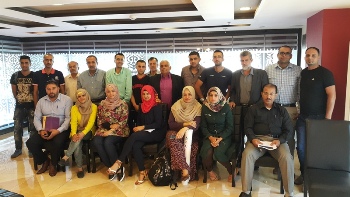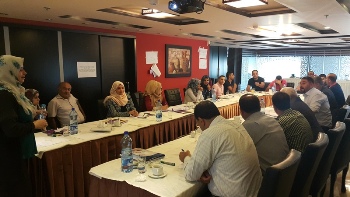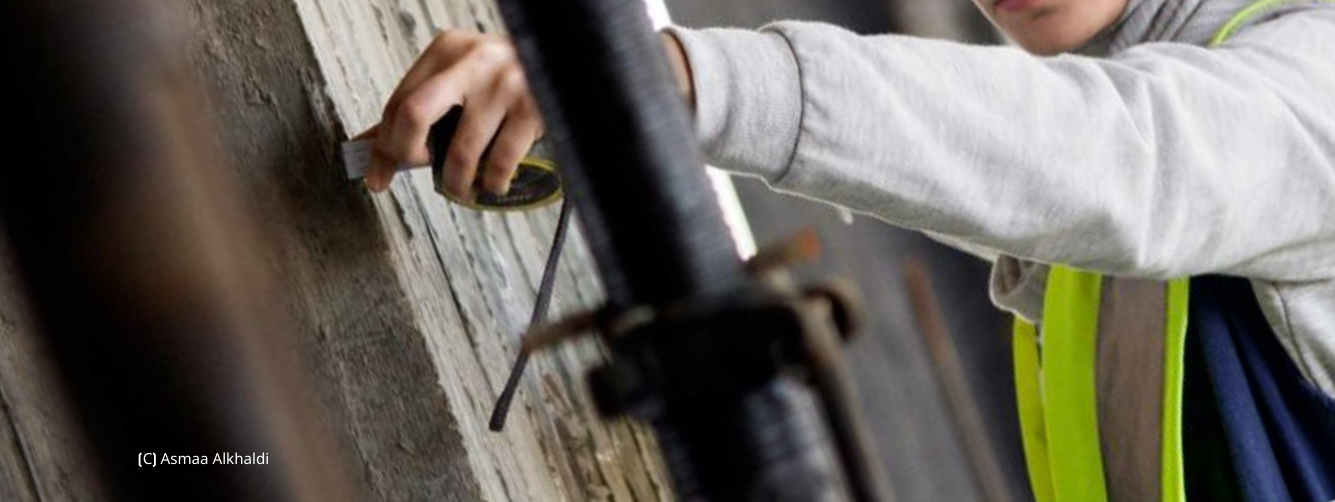
The Dura Municipality in the Hebron district is unique. It stands apart from the other municipalities and local councils in Palestine because it has achieved something the others have not. It is involving Dura residents in the preparation of the town’s budget, therefore ensuring that the budget includes the most important priorities and needs of the residents. According to engineer Maher Qazzaz, director of the municipality’s water and sanitation department and coordinator for the participatory budgeting process, approximately 40,000 people currently lie inside the Dura municipal boundaries. This number increases to 100,000 when the dozens of nearby hamlets are included, which are also within the municipality’s jurisdiction.
A true success story
Qazzaz described the project “Enacting community participation in monitoring the general budget and tax reform” implemented by MIFTAH, funded by OXFAM and in partnership with the Dura municipality, as a huge success. He said the residents of Dura were proud that their voices could now be heard regarding their priorities and needs. A training process took place leading up to this, from September 2015 until January, 2016, which included training courses and follow up, planning and communication with the community and a review and preparation of the budgets, followed by the preparation of the participatory and citizens’ budget.
Citizen interaction
Qazzaz says: Citizens in Dura are now fully informed about the income and expenditures of the municipality and are privy to every detail that goes on inside. This was not the only success, he says. The municipality held six community meetings of 15-20 residents each, to understand the needs of each area. This was preceded by an introductory meeting at the municipality which was attended by residents representing all sectors. In these meetings, the people pinpointed the various needs of the agricultural, education, health and housing sectors after which the municipality met with neighborhood committees – each neighborhood was divided into nine committees – and each committee presented its most pressing priorities and needs.
A quantum leap
Dura mayor, Dr. Samir Namura, said the impact of MIFTAH’s training on his hometown was huge. He said the workshops comprised a ‘quantum leap” in the relationship between Dura’s residents and the municipality, by promoting the role of citizens through involving them in the preparation of the municipality’s budget in a way that reflects their demands and needs. “The residents now have a good understanding of the importance of participatory budgeting and also the importance of community participation in general,” Namura says. He continues that this has had a very constructive impact on the municipality’s approaches, adding that it will allot at least 50% of allocations to citizens in its upcoming participatory budget.
Furthermore, the municipality’s plans to work with MIFTAH in designing and publishing a citizens’ budget for the 2016 budget and future years, is affirmation that the municipality and its partners are serious about actively involving citizens in its financial policies.
Sustainable relationship with MIFTAH
On MIFTAH’s training with the Dura municipality in partnership with the town’s civil society organizations, Fatima Al Batma says: “The process built trust in the relationship between the municipality and the residents. It also boosted capacities among the municipality’s employees in communicating with the community to reflect their needs, not only in the municipality’s developmental plans but also its financial ones. She said the municipality listening to the concerns and issues of the residents was a ‘huge step forward.”
Batma continued that during the period of joint cooperation, some of the plans were put into action. For example, coordination was carried out with the Kareesa girl’s secondary school and with a number of neighborhood representatives for certain interventions. She said for the most part, the needs of the residents were referred to the 2016 budget. Furthermore, the municipality’s annual plan catered to the needs expressed by the citizens, with a portion of the priorities exclusively included in the participatory budget. “This ensures that the process of follow-up, monitoring and accountability effectively continues,” she said, adding that the allocations for participatory budgeting in the 2016 budget were 30% of the developmental budget and 5% of the overall budget of the municipality.
A transformational and successful process
In her assessment of the process, Batma said: “I think it was a transformational and successful process at more than one level. Most importantly, some of the knowledge was translated into action. For example, of the 20 people who participated in the training, 80% of them had no knowledge about budgets. This was transformed into 80% of them having the knowledge and ability to participate in developing budgets including participatory and citizens’ budgets.”
The success of the endeavor was not only about reading and reviewing budgets but also about passing on knowledge and motivating community groups to participate in determining expenditure priorities. The process promoted commitment to their obligations as citizens and beneficiaries of the municipality and towards developing the relationship between the municipality and civil society institutions, which played a major role in the process. The civil society also benefited in terms of promoting their role in accountability and participation in local development.
This is the first time a budget is developed in consultation and participation with the local community. The process was carried out with technical support and consultations, which were offered to the municipality team leading the process. This will allow the team to carry out the process in the years to come and even develop techniques and tools based on the skills and information acquired in the previous experience.
What did the participants have to say?
Volunteer at the Sawa’id institution, Ayat Sweiti said: “After the community was divided into sectors and neighborhoods, I felt the meetings were very positive in terms of how people were addressing each other. People felt they were partners in the decision-making process.”
Ayat said she also personally gained from the experience, saying she learned how to initiate and persevere no matter how difficult the task at hand is. “I acquired new life skills,” she said.
Engineer and municipality employee Ala’ Sweiti admits that when she was invited to the workshop she didn’t have much of an idea about budgets, including participatory ones. After participating, she said the process elevated her to a new level of thinking. “As a citizen, I learned for the first time that it is my right to ask, to monitor and to follow up and that it is my duty to make my voice heard. It is not enough to criticize and do nothing,” she said.
As a municipality employee, Ala’ said she also learned how important it is for the municipality to adopt the principle of transparency in terms of opening the door to dialogue, listening to citizens’ grievances and rebuilding bridges of mutual trust between the people and the municipality.
Another Dura municipality employee Mohammed Shadid said the participatory budgeting process helped to dismantle nepotism networks through creating groups of citizens with a variety of expertise, active participation, capabilities and competencies. “These new practices meant that all of the municipality’s files were open to the groups.”
His experience was so positive, Mohammed said he wants to bring others on board. “I am going to promote participatory budgeting as the best experience for good governance in local councils and as the best means of increasing investments in poor and marginalized areas.”









